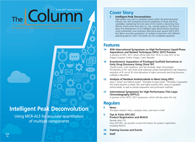45th International Symposium on High Performance Liquid Phase Separations and Related Techniques (HPLC 2017) Preview
A preview of HPLC 2017, which will be held from 18 to 22 June 2017 at the Prague Congress Centre, Prague, Czech Republic.
Photo Credit: NaughtyNut/Shutterstock.com

A preview of HPLC 2017, which will be held from 18 to 22 June 2017 at the Prague Congress Centre, Prague, Czech Republic.
The 45th International Symposium on High Performance Liquid Phase Separations and Related Techniques (HPLC 2017) will be held from 18 to 22 June 2017 at the Prague Congress Centre, Prague, Czech Republic.
The HPLC symposium series is a world-leading forum for the exchange of information among researchers involved in separations in liquid phases and supercritical fluids. The conference programme covers everything from fundamental and experimental approaches to column technologies and cuttingâedge applications and instrumentation. HPLC’s 2017 programme continues the trend of including separations coupled with mass spectrometry (MS), with one programme track now devoted solely to hyphenated techniques. Similarly, new trends, such as microfluidics and nanotechnologies, have been added. Vendors have always presented their latest technical innovations at the exhibition, which has always been an important part of the conference, and HPLC 2017 Prague will continue this tradition.
The future of any field depends on its accessibility and appeal to the younger generation. To this end, we have decided that one of the main goals
of the HPLC 2017 Prague symposium will be to attract the active participation of young researchers. For the first time, one of the four parallel programme tracks will be devoted solely to young speakers and tutorial lectures given by top experts. Eight different short courses will be presented by leading experts in many fields of analytical separations and mass spectrometry. Traditional awards presented during the symposium will include the Csaba Horváth Young Scientist Award for the best young speaker at the symposium, the Uwe D. Neue Award, the Best Poster Award, and the Georges Guiochon Faculty Fellowship for excellent young scientists in liquid phase separation sciences. Significant support for students and postdocs is available. A number of travel grants will be offered by various organizations for students and young postdocs to allow them to actively participate at the symposium.
Complementing the young scientists section (YOU), the three other programme tracks will include:
- Fundamentals (FUN)-covering research from mechanisms of mass transport phenomena to data analysis, and validation and chemometrics
- Hyphenations (HYP)-highâresolution separations, mass spectrometry coupled to highâthroughput data processing, and bioinformatics
- Applications and Instrumentation (APP)-including a diverse portfolio of integrated “omics” approaches and systems biology, clinical and environmental analysis, food analysis, and [bio]pharmaceuticals and drug metabolism.
Time will be dedicated to poster sessions and leading scientists from all over the world will be presenting exciting and motivating plenary, keynote, and tutorial lectures. The list of all oral presentations is being continuously updated. Please see the conference website for more details.
Prague is easily accessible from all major European and many overseas destinations and offers a wide range of accommodation for all budgets. An exciting social and scientific programme awaits participants. Attendees will enjoy the rich cultural and historical treasures of Prague, UNESCO cultural heritage sites, and the Czech hospitality, which includes a wide range of excellent Czech beers.
The organizers look forward to welcoming you in Prague!
Chairmen: Michal HolcËapek and František Foret
E-mail:info@hplc2017-prague.org Website:www.hplc2017-prague.org



















Polysorbate Quantification and Degradation Analysis via LC and Charged Aerosol Detection
April 9th 2025Scientists from ThermoFisher Scientific published a review article in the Journal of Chromatography A that provided an overview of HPLC analysis using charged aerosol detection can help with polysorbate quantification.
Analyzing Vitamin K1 Levels in Vegetables Eaten by Warfarin Patients Using HPLC UV–vis
April 9th 2025Research conducted by the Universitas Padjadjaran (Sumedang, Indonesia) focused on the measurement of vitamin K1 in various vegetables (specifically lettuce, cabbage, napa cabbage, and spinach) that were ingested by patients using warfarin. High performance liquid chromatography (HPLC) equipped with an ultraviolet detector set at 245 nm was used as the analytical technique.
Removing Double-Stranded RNA Impurities Using Chromatography
April 8th 2025Researchers from Agency for Science, Technology and Research in Singapore recently published a review article exploring how chromatography can be used to remove double-stranded RNA impurities during mRNA therapeutics production.
Polysorbate Quantification and Degradation Analysis via LC and Charged Aerosol Detection
April 9th 2025Scientists from ThermoFisher Scientific published a review article in the Journal of Chromatography A that provided an overview of HPLC analysis using charged aerosol detection can help with polysorbate quantification.
Analyzing Vitamin K1 Levels in Vegetables Eaten by Warfarin Patients Using HPLC UV–vis
April 9th 2025Research conducted by the Universitas Padjadjaran (Sumedang, Indonesia) focused on the measurement of vitamin K1 in various vegetables (specifically lettuce, cabbage, napa cabbage, and spinach) that were ingested by patients using warfarin. High performance liquid chromatography (HPLC) equipped with an ultraviolet detector set at 245 nm was used as the analytical technique.
Removing Double-Stranded RNA Impurities Using Chromatography
April 8th 2025Researchers from Agency for Science, Technology and Research in Singapore recently published a review article exploring how chromatography can be used to remove double-stranded RNA impurities during mRNA therapeutics production.
